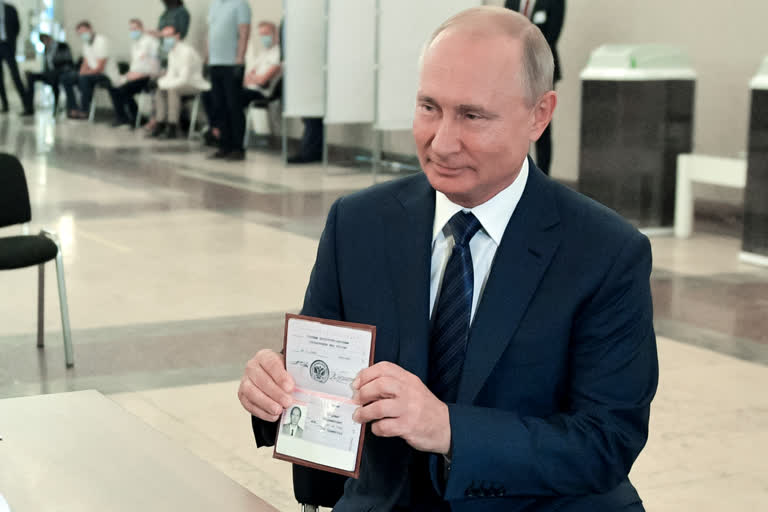Moscow:Russian voters approved changes to the constitution that will allow President Vladimir Putin to potentially hold power until 2036, but the weeklong plebiscite that concluded on Wednesday was tarnished by widespread reports of pressure on voters and other irregularities.
With three-fourths of all precincts counted, 77.6% voted for the constitutional amendments, according to election officials.
For the first time in Russia, polls were kept open for a week to bolster turnout without increasing crowds casting ballots amid the coronavirus pandemic — a provision that Kremlin critics denounced as an extra tool to manipulate the outcome.
A massive propaganda campaign and the opposition’s failure to mount a coordinated challenge helped Putin get the result he wanted, but the plebiscite could end up eroding his position because of the unconventional methods used to boost participation and the dubious legal basis for the balloting.
The amendments that would allow Putin to run for two more six-year terms, in 2024 and 2030, are part of a package of constitutional changes that also outlaw same-sex marriage, mention a belief in God as a core value and emphasize the primacy of Russian law over international norms.
Voters could not cast ballots on the individual amendments, only on the entire group.
Read |Putin 2036: Russians agree to extend president's rule
Nationwide turnout was reported at 65% of the electorate.
Kremlin critics and independent election observers questioned the turnout figures.
“We look at neighbouring regions, and anomalies are obvious — there are regions where the turnout is artificially boosted, there are regions where it is more or less real,” Grigory Melkonyants, co-chair of the independent election monitoring group Golos, told.
Putin voted at a Moscow polling station, dutifully showing his passport to the election worker. His face was uncovered, unlike most of the other voters who were offered free masks at the entrance.
The vote completes a convoluted saga that began in January when Putin first proposed constitutional changes including broadening the powers of parliament and redistributing authority among the branches of government. Those proposals stoked speculation he might seek to become a parliamentary speaker or chairman of the State Council when his presidential term ends in 2024.
Watch |Putin mandates himself to rule Russia until 2036
His intentions became clear only hours before a vote in parliament, when legislator Valentina Tereshkova, a Soviet-era cosmonaut who was the first woman in space in 1963, proposed letting him run two more times. The proposed changes were quickly passed by the Kremlin-controlled legislature.
The 67-year-old Putin, who has been in power for more than two decades — longer than any other Kremlin leader since Soviet dictator Josef Stalin — said he would decide later whether to run again. He argued that resetting the term count was necessary to keep his lieutenants focused on their work instead of darting their eyes in search of possible successors.
Analyst Gleb Pavlovsky, a former Kremlin political consultant, said Putin’s push to hold the vote even though Russia has thousands of new coronavirus infections each day reflected his potential vulnerabilities.
“Putin lacks confidence in his inner circle and he’s worried about the future,” Pavlovsky said. “He wants irrefutable proof of public support.”
Even though the parliament's approval was enough to make it law, the 67-year-old Russian president put his constitutional plan to voters to showcase his broad support and add a democratic veneer to the changes. But then the coronavirus pandemic engulfed Russia, forcing him to postpone the April 22 plebiscite.
The delay made Putin’s campaign blitz lose momentum and left his constitutional reform plan hanging as the damage from the virus mounted and public discontent grew. Plummeting incomes and rising unemployment during the outbreak have dented his approval ratings, which sank to 59%, the lowest level since he came to power, according to the Levada Center, Russia’s top independent pollster.
